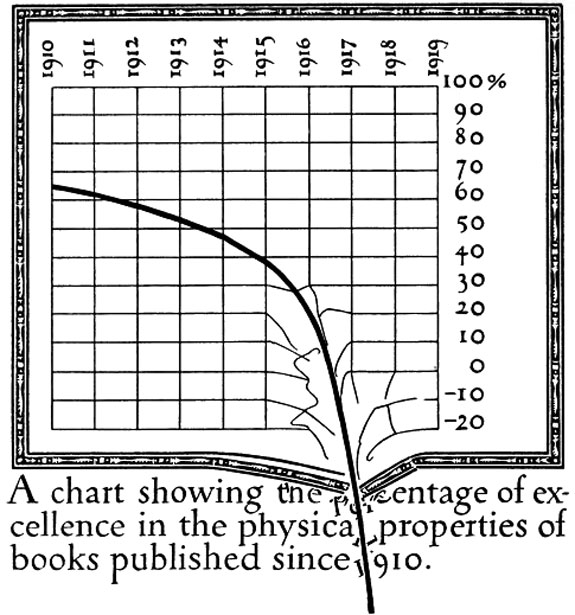December 1

From Boylston Street in Boston, Massachusetts there was published on this day in 1919 an outrageous pamphlet which purported be “Extracts from an investigation into the physical properties of books as they are at present published, undertaken by the Society of Calligraphers.” A note explained: ‘The accompanying extracts from the Transactions of the Society of Calligraphers are published with the approval of the Society. They form a part of the exhaustive and unbiased Report returned by the Committee in charge of the investigation, which Report will be presented in its entirety in the Annual Bulletin. The report is of so surprising a nature that it was deemed unwise to withhold all notice of the findings until the annual publication. The Society, therefore, has the honour to present certain portions of the Inquiry, together with an abstract of the Committee’s recommendations. (signed) W.A. Dwiggins, Secretary.”
Here was Will Dwiggins in the role credited to him by his friend Watson Gordon, “a sort of self-appointed inspector of sacred cows; an exposer of their glandular effects. If it seems advisable in the public interest to send them to the glue factory, he is willing to drive the wagon.” In the publication of this report Dwiggins was aided and abetted by his cousin, Mr. Laurance B. Siegfried.
American book publishers were taken completely by surprise when the Extracts were circulated. They were also shocked. The committee had purported to have examined all books published in the United States from 1910, and its conclusions were that “All Books of the present day are Badly Made.” The report itself was in the form of a dialogue between the Committee and people who were responsible for the various aspects of production in the publishing industry.
In the very first paragraph the tone was set:
“Q. Mr. B—, will you please tell the committee why you printed this book on cardboard?
A. To make it the right thickness. It had to be one inch thick.
—Why that thick, particularly?
—Because otherwise it would not sell.
—If a book isn’t one inch thick it won’t sell.
—Do you mean to say that people who, buy books select them with the help of a foot rule?
—They have to have some standard of selection.
—So that it is your practice to stretch out the text if it is too short by printing it on egg-box stock?
—Not my practice, particularly. All publishers do it. We are obliged to use this and other means to bring the book up to a proper thickness. You must remember that our prices are not based on the contents of the book but on its size.”
In summarizing, the Committee stated its intention of “forcing upon public attention such knowledge of the more elementary points of good taste as shall make impossible the further prostitution of standards.” American publishers were agreed upon one thing—the immediate lynching of the Secretary of the Society of Calligraphers, an act of revenge which fortunately did not take place. Retribution of a different nature was visited upon Dwiggins. He became a book designer. For the rest of his life he was more or less responsible for demonstrating through his own works his summarizations as a critic.